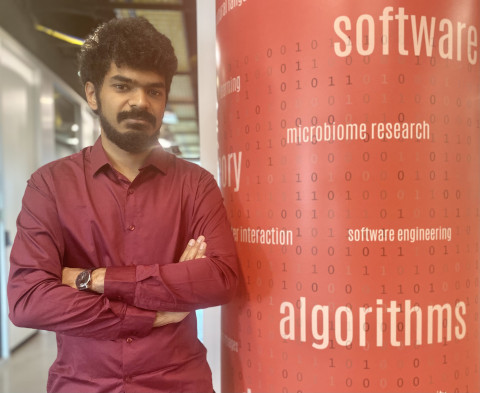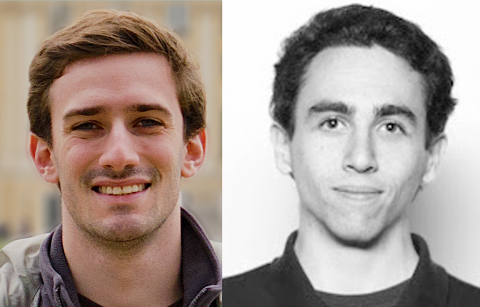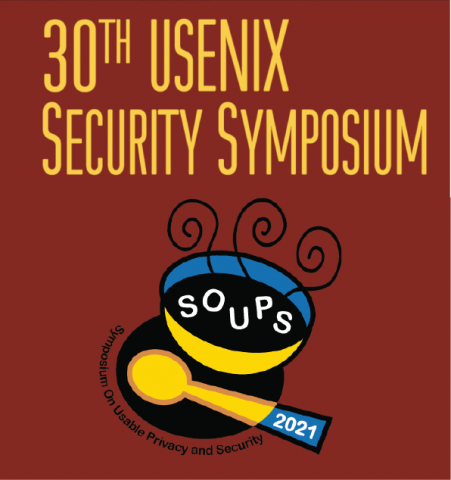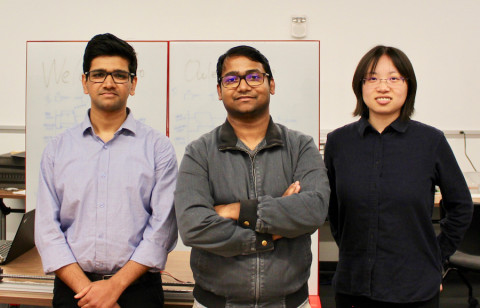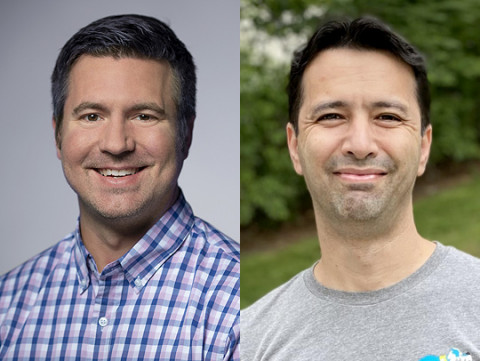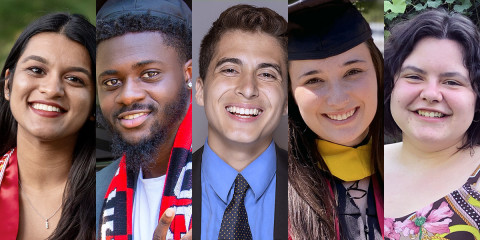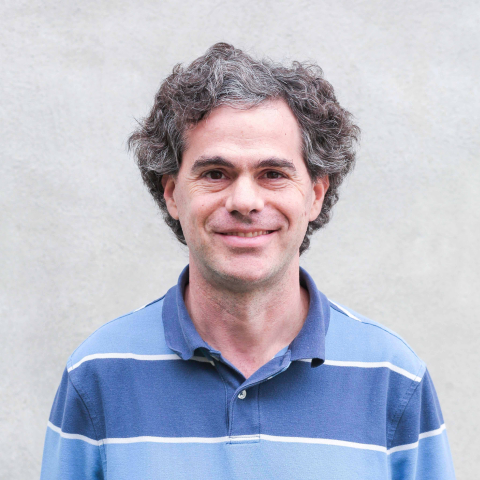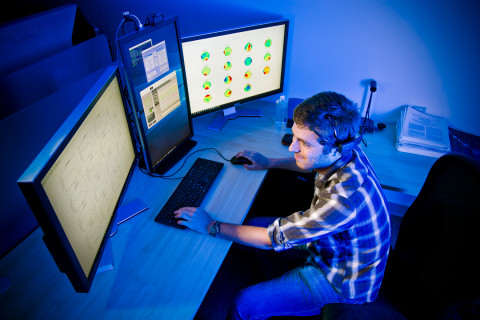Recent News & Accomplishments
2021
Jamshed Khan , a third-year computer science doctoral student, recently received the Ian Lawson Van Toch Memorial Award for Outstanding Student Paper at the 2021 Conference on Intelligent Systems for Molecular Biology (ISMB) and European Conference on Computational Biology (ECCB) . ISMB is the flagship meeting of the International Society for Computational Biology (ISCB). The event is co-located with ECCB and has grown to become the world’s largest bioinformatics and computational biology conference. The conference was held virtually July 25–30 due to the ongoing COVID-19 pandemic. The award... read more
Two accomplished postdoctoral researchers will bring their expertise in designing secure software systems and usable security and privacy.
Ethan Cecchetti (left in photo) and Nathan Malkin (right)—both of whom recently received doctorates in computer science from Cornell University and UC Berkeley, respectively—will start at the Maryland Cybersecurity Center ( MC2) in September. Cecchetti will be working primarily with Michael Hicks , a professor of computer science with joint appointments in MC2 and the University of Maryland Institute for Advanced Computer Studies (UMIACS). Cecchetti’s research focuses on designing secure software systems and building tools to ease their development. He is the second recipient of the MC2... read more
Faculty, postdocs and students in the department of computer science who are also the core researchers in the Maryland Cybersecurity Center (MC2) will present 10 papers next month at co-located symposiums focused on the security and privacy of computer systems and networks, as well as human-computer interaction, security and privacy. Things kick off on August 8 with 17 th Symposium on Usable Privacy and Security (SOUPS), followed on August 11 by the 30 th USENIX Security Symposium . Both events are being held in a virtual format this year due to the ongoing COVID-19 pandemic. UMD researchers... read more
Their innovative design explores the interaction of soundwaves with acoustic structures for spatial sensing.
Researchers at the University of Maryland were recently recognized for their prototype of a miniature spatial acoustic sensing system that can be used for insect-sized robots and on-body sensing devices. The UMD team (pictured left to right)— Nakul Garg , a second-year computer science doctoral student, Nirupam Roy , an assistant professor of computer science, and Yang Bai , a first-year doctoral student—received “Best Demo” award at the 19 th ACM International Conference on Mobile Systems, Applications, and Services (MobiSys2021). The annual conference, hosted by the Association for... read more
Rising junior computer science major earned prestigious award to explore his interests in oceanic and atmospheric science.
Eric Robinson, a junior computer science and geographical sciences dual-degree student at the University of Maryland, received a 2021 National Oceanic and Atmospheric Administration (NOAA) Ernest F. Hollings Scholarship . Robinson plans to apply his coding skills in Earth studies to preserve wildlife and the natural environment. Hollings Scholars receive up to $19,000 over two years, as well as professional development opportunities including a 10-week paid summer internship at a NOAA facility the summer after their junior year. The Hollings Scholarship program is designed to prepare... read more
CS alumni Evren Sirin and Mike Grove are on a mission with their knowledge graph platform company Stardog
In 2002, in two different laboratories in the same building at 8400 Baltimore Avenue, adjacent to the University of Maryland campus, two computer scientists were working on making workplace technology smarter—they just didn’t know each other yet. On the second floor, recent graduate Mike Grove (B.S. ’02, computer science) was exploring dynamic office environments as a research assistant for Fujitsu, an information and communication technology company. Below him on the first floor, Evren Sirin (M.S. ’04, Ph.D. ’06, computer science) was taking his thesis research in exactly the same direction... read more
The award was established in 2015 to recognize the contributions of professional-track faculty members in the areas of teaching, research or service.
You’ve likely heard the saying “If you love what you do, you’ll never work a day in your life.” This statement rings true for Fawzi Emad , a senior lecturer in the University of Maryland’s Department of Computer Science. “I'm lucky enough to be teaching material that I truly enjoy,” he said. “I actually look forward to giving lectures, and I can honestly say that I never get out of bed dreading the work day ahead.” Last month, Emad’s passion for teaching was recognized by his peers when he received a 2020-2021 Provost's Excellence Award for Professional Track Faculty in recognition of his... read more
Students took advantage of on- and off-campus resources to advance their careers
An internship can launch a career — at least that’s what several computer science majors who graduated from the University of Maryland in May learned from experience. Gesna Aggarwal entered her senior year with a job offer from Microsoft in hand after interning with the company in summer 2020. Though her internship was virtual, she forged connections with her team at Microsoft that led her supervisor to recommend her for a full-time job. And she’s not the only one. According to UMD’s 2020 Graduation Survey Report, 41% of computer science graduates reported finding employment through... read more
Daniel Gottesman joined the University of Maryland's Department of Computer Science and Institute for Advanced Computer Studies (UMIACS) on July 1, 2021, as the Brin Family Endowed Professor in Theoretical Computer Science. He joined UMD from the Perimeter Institute in Waterloo, Canada. “I'm excited to join the team at the University of Maryland working on quantum information,” said Gottesman, who also has an appointment in the Joint Center for Quantum Information and Computer Science (QuICS) as a QuICS Fellow. “Maryland was already a powerhouse in quantum information and some fabulous new... read more
Eric Krokos ’13, M.S. ’15, Ph.D. ’18 was part of a UMD team that used electroencephalography (EEG) to better understand and work toward solutions for VR-induced discomfort.
If a virtual world has ever left you feeling nauseous or disorientated, you’re familiar with cybersickness, and you’re hardly alone. The intensity of virtual reality (VR)—whether that’s standing on the edge of a waterfall in Yosemite or engaging in tank combat with your friends —creates a stomach-churning challenge for 30-80% of users. In a first-of-its kind study, researchers at the University of Maryland recorded VR users’ brain activity using electroencephalography (EEG) to better understand and work toward solutions to prevent cybersickness. The research was conducted by computer science... read more
